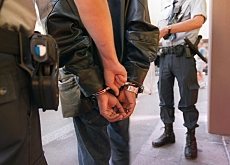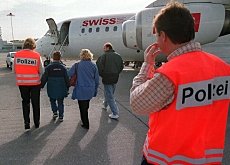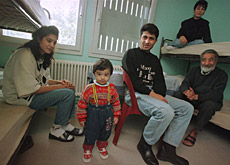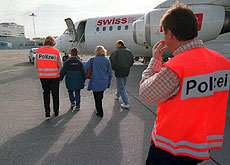Amnesty renews calls for action on asylum

The Swiss branch of Amnesty International has again called for a change of direction in asylum policy in Switzerland.
At a meeting on Sunday, the human-rights organisation criticised deportation procedures for rejected asylum seekers and proposals to toughen the asylum law.
In a statement, Amnesty said it knew of at least three cases since 2003 where people form Syria, Libya and Myanmar had been imprisoned after their applications to stay in Switzerland had been rejected.
The 200 delegates at the conference in Rorschach in canton St Gallen called on the government and the Federal Migration Office to look into these cases and make sure that such situations did not happen again.
They said that Switzerland should adhere to the principle of non-refoulement – not to send people home who are at risk in their own countries, as set down in international refugee law.
Amnesty said it was particularly worried by the fate of rejected asylum seekers facing deportation in canton Vaud. This included people from Syria and other countries who could face problems if returned to their homelands, it said.
The organisation called on the cantonal government to ensure that these asylum seekers were not sent back.
Vaud’s cantonal government has been criticised in the past for being reluctant to follow government guidelines and expel rejected asylum seekers. But last year it came under pressure from the federal authorities in Bern to fall into line with other cantons.
Asylum law
Amnesty is also concerned about proposals to tighten the asylum law that would speed up the processing of applications and pressure rejected asylum seekers to leave the country.
It therefore called on the government to maintain the right to emergency aid, to continue to give assistance to rejected asylum seekers and not to double the maximum detention period for asylum seekers to two years.
The asylum law should guarantee human dignity and the respect of human rights, said Amnesty.
This is not the first time that Amnesty has got involved in the asylum debate in Switzerland.
At the beginning of May it called on the United Nations’ Committee against Torture (CAT) to give Switzerland a rough ride when it presented its report on the country.
It said it was particularly concerned about the toughening of the asylum law and police use of electroshock weapons during deportations.
The CAT report, published on May 20, expressed its unease at the proposed use of electroshock weapons during forced deportations. It also urged Switzerland to include an explicit definition of torture in its penal code.
swissinfo with agencies
The principle of non-refoulement is set down in the United Nations Refugee Convention of 1951 and repeated in other international instruments.
It forbids the deportation of an asylum seeker to an area where his or her life or freedom is threatened.
According to Amnesty International Switzerland, three people deported from Switzerland since 2003 were imprisoned on their return.

In compliance with the JTI standards
More: SWI swissinfo.ch certified by the Journalism Trust Initiative



You can find an overview of ongoing debates with our journalists here . Please join us!
If you want to start a conversation about a topic raised in this article or want to report factual errors, email us at english@swissinfo.ch.